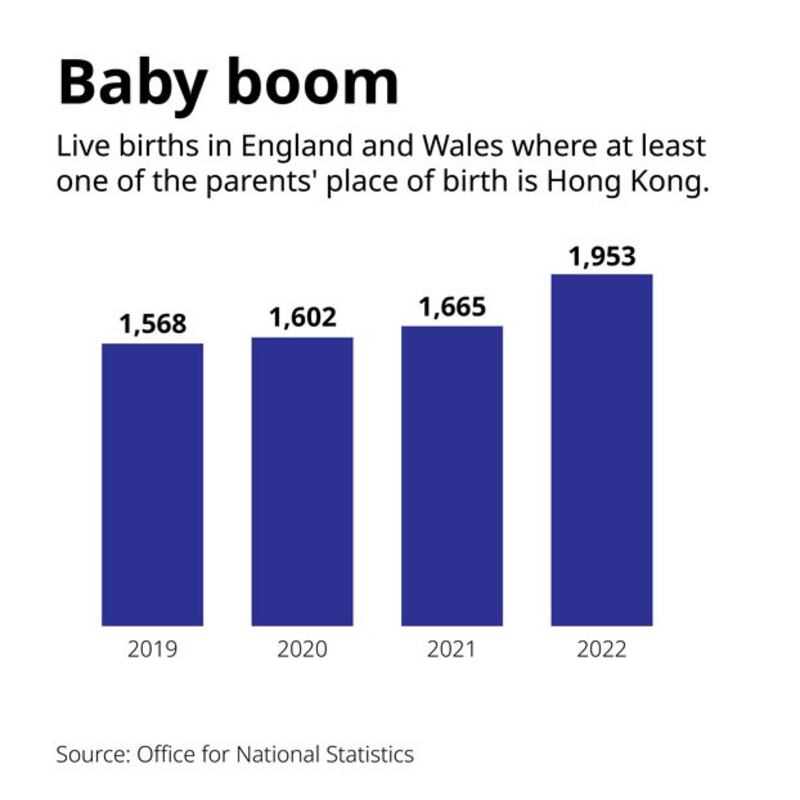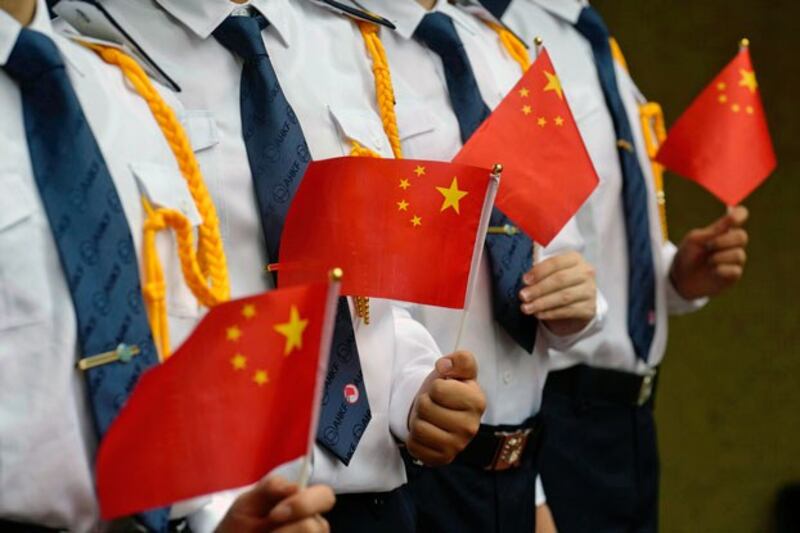As authorities back home battle falling birth rates amid an ongoing exodus of young families, Hongkongers are having their babies in the United Kingdom, drawn by educational freedom and affordable healthcare, Radio Free Asia has learned.
More than 144,000 Hongkongers moved to the U.K. during the first two years of the British National Overseas visa scheme, which offers a pathway to long-term residency and citizenship – and British government data shows that they seem to be keen to start families outside of Hong Kong.
Nearly 2,000 babies were born to a Hong Kong parent in England and Wales during 2022, according to the Office of National Statistics.
New parents living in the country told RFA Cantonese that they left the city to raise their families in a freer environment.
"I want my kids to get a British education in the U.K., and have the right to choose not to do certain things," one new parent who gave only the nickname Tommy for fear of political reprisals back home, told Radio Free Asia.
"In Hong Kong, you don't have that choice, because other people, or the environment you are in forces you to do certain things," he said.
Like many other young families, Tommy and his wife were keen to avoid having their children educated in Hong Kong's schools, which have been targeted for ideological re-education following a wave of pro-democracy movements in the city that the ruling Chinese Communist Party and Hong Kong security chiefs regard as subversive.
"The biggest difference between having kids in the U.K. and having them in Hong Kong is the education system," he said.
Many who have left the city did so citing ongoing political repression under a draconian security law, along with the brainwashing of their children in the form of "patriotic" and " national security" classes that are now mandatory from kindergarten to university, as the government encourages people to inform on each other.
Falling birth rates
Birth rates in Hong Kong began declining in 2014, but plummeted sharply in the wake of the 2019 protest movement and subsequent political crackdown, reaching their lowest level since 1960.
While the population showed a slight uptick following the scrapping of COVID-19 travel curbs, birth rates in the city haven't caught up, with the number of newborns falling by 38% between 2019 and 2022, according to government data.

New parents from Hong Kong have been pleasantly surprised at the services available on the country's National Health Service, or NHS, which are free at the point of use once visa-holders pay the annual Immigration Surcharge of £624 (US$770) that will rise to £1,035 (US$1,275) in 2024.
"In Hong Kong public hospitals, you are in a passive position, but in the U.K. you can choose whether to do something or not," Tommy said, citing his wife's choice of different pain relief options during labor.
"The environment for giving birth in Hong Kong [public hospitals] is very crowded, and there is no choice," Tommy said. "The hospital won't let a woman choose pain relief or a cesarean delivery – it's all a matter of luck."
A single mother who arrived in the U.K. six months pregnant in 2021 and asked to be identified by the initial L said she had worried about the reception she would get on arriving in Britain, and was pleasantly surprised to be given extra help.
"The doctors and nurses were much better than I thought they would be," L said. "They didn't ask much about my identity – they were more concerned about the condition of me as mother and that of my baby."
"I wanted a natural birth, but it ended up being a cesarean section ... but they didn't charge me extra for that, and ... they gave me a room of my own in a special intensive care unit because I'd lost a lot of blood," she said. "I never received any bill from the NHS."
L was also happy to find that baby formula and diapers were much cheaper than in Hong Kong.
"The brand of milk powder we use is just £9 [US$11], but in Hong Kong a can of baby formula costs HK$500-600 [US$64-77]," she said. "It's not as tough to raise a kid as I thought it would be."
She said there are many more services and facilities for young children than back home, citing free libraries, free fruit in supermarkets and other recreational facilities.
"That kind of thing makes it feel as if children are welcome here," she said.
Baby's roots are in Hong Kong
A 31-year-old mother who gave only the nickname Becky, said she gave birth to her son in a London hospital in September, and is enjoying a longer maternity leave than she would have gotten in Hong Kong.
She was also pleased not to have any medical expenses beyond the Immigration Surcharge.
"With the NHS, the entire delivery process costs nothing, if you don't want to go private," she said. "If there are any issues, the hospital will be more worried about them than you."
"When our baby was being examined, the doctor said he was a little worried, so we did a whole bunch of genetic tests without paying a penny. In the end, the genetic report showed that there was no problem," Becky said.
By comparison, permanent residents of Hong Kong will be charged an admission fee of HK$75 (US$10), then HK$120 (US$15) a day for their stay in hospital.

Becky said she sees her new, and third, child as British, but will raise him to speak Cantonese, the lingua franca of Hong Kong, and teach him everything about the city they once called home.
"He may have been born ... in the UK, [but] his parents are from Hong Kong, and his roots are there," she said. "We have agreed that we will speak Cantonese to him, although he may not be able to read or write [Chinese]."
"We won't force it on him, but we will show him everything about Hong Kong, hoping he will like it."
Tommy said he would be taking a similar approach.
"We hope that our child will identify as British, because he was born in the U.K., after all," he said. "But we want him to know why his parents came to the U.K."
"We won't forget the causes or the details of our story, and we want him to know that he is of Hong Kong descent, and we will pass on the values of the people of Hong Kong to the next generation," Tommy said.
The 'Lion Rock spirit'
L said she isn't sure quite how to define a Hongkonger, but says it is something to do with an attitude, citing the "Lion Rock spirit," shorthand for an identity that is specific to Hong Kong.
"I'm not sure how everyone else defines a Hong Kong person, but my definition is that they have the Lion Rock spirit," L said. "I think Hong Kong isn't so much a place as a state of mind."
L said she already has her daughter listen to Cantonese rap, because it's what she grew up listening to.
"Some Cantonese songs have more of the written [Chinese] language, but rap isn't like that -- it's purely spoken language," she said. "We grew up in Hong Kong, and listening to rap is more authentic."
As for the Hong Kong government's attempts to boost birth rates, L thinks they won't have much impact, because only a fundamental change in the political situation will encourage people to have more children.
"[Without that], they shouldn't bother doing anything," she said.
Edited by Luisetta Mudie.
